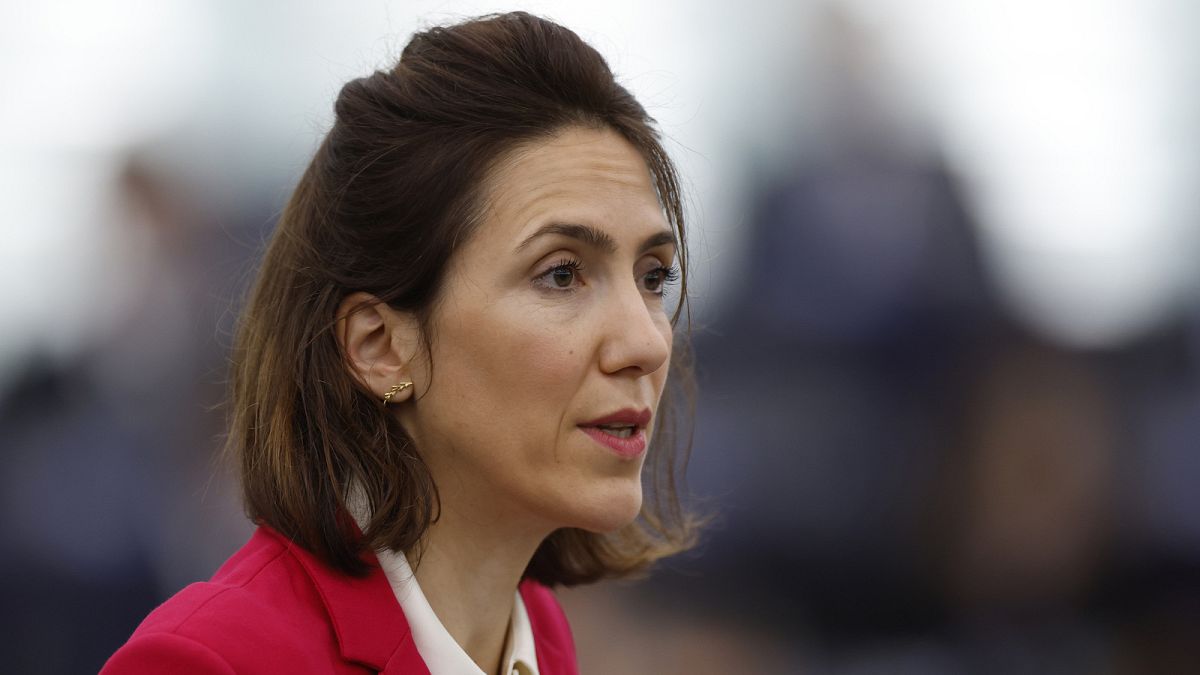Europe’s destiny intertwined with Ukraine’s, EU Liberals chief says in Kyiv
EU Liberals leader Valérie Hayer reasserted her centrist party’s unwavering support to Ukraine during a two-day visit to the war-torn country, as security takes centre stage in the campaign for June’s European elections. Hayer, who leads the Renew Europe group and has been fielded as one of its three lead election candidates, told Euronews that she […]


EU Liberals leader Valérie Hayer reasserted her centrist party’s unwavering support to Ukraine during a two-day visit to the war-torn country, as security takes centre stage in the campaign for June’s European elections.
Hayer, who leads the Renew Europe group and has been fielded as one of its three lead election candidates, told Euronews that she wanted to “go on the ground” to better understand the “political” and “military” reality in Ukraine.
“We must explain to European citizens that this war in Ukraine has a huge impact for us, and the security of Ukrainian people is our security,” Hayer said on Wednesday. “Our destiny is intertwined.”
The visit came amid fears that Russian President Vladimir Putin could ramp up attacks on Ukraine after attempting to implicate Kyiv in a terror attack on a Moscow concert hall last Friday in which at least 143 people lost their lives.
Ukrainian military sources say Russia fired at least 26 ballistic missiles at Kyiv in the last week, hitting civilian infrastructure.
With uncertainty over the future of US support following November’s presidential election and ammunition stockpiles depleting quickly, Kyiv is increasingly leaning on its European allies to replenish its stocks.
“The greatest security fear is the growing gap in our artillery firepower,” Ukraine’s deputy minister of defence, Yuriy Dzhygyr, told Euronews.
“We have the support, we feel the support, we understand there are technical problems with the replenishment of stocks but we feel your solidarity and very much appreciate it.”
It means political parties have made supporting Ukraine – and reinforcing Europe’s own defensive capacities – a centrepiece of their election platforms.
A position paper on European defence unveiled by the Renew group on Wednesday pitches “drastically enhancing” joint European procurement of arms, and increasing defence spending on both EU and national level.
Ukraine’s battlefield setbacks in recent weeks have instilled a sense of urgency among EU leaders, who are breaking with precedent to increase the flow of military and financial aid to their war-struck neighbour.
The bloc is proceeding rapidly to use windfall profits from Russian assets immobilised in the EU to buy more arms, and is even opening a fraught dialogue on the divisive prospect of raising joint EU debt to fund defence needs.
Speaking from Ukraine, Hayer said it’s time to take a “leap forward in European defence.”
“A real European Defence Union will save money by stopping duplication and waste, but to do this we must invest now and invest in Europe’s defence industrial base,” she said.
The Renew group is on track to narrowly cling on to its position as the European Parliament’s third biggest faction, according to an exclusive poll by Ipsos.
Hayer is one of Renew’s lead EU candidates, and is also heading the list of Emmanuel Macron’s Renaissance party in France.
Our poll’s most recent projections put Renew at 87 seats, and the surging far-right Identity and Democracy (ID) at fourth place with 80 seats.
ID’s projected 31-seat leap is propelled by the success of France’s Rassemblement National and its lead candidate, 28-year-old Jordan Bardella, who will compete with Hayer for the French vote and who has broken with his party’s historically close ties with Russia by adopting a hard line on Moscow.
Boost for Kyiv’s EU membership bid
Hayer also promised to move Ukraine forward on its path to EU membership by pitching observer status for Ukrainian lawmakers in the European Parliament “as soon as possible.”
The process of gaining accession to the bloc is notoriously long, and despite EU leaders green-lighting the opening of formal talks with Ukraine last December, the road to full-fledged EU membership is long.
It has prompted the bloc to float ways of gradual integration, including by gathering politicians from candidate countries around the decision-making table before the accession process is completed.
“We want Ukrainian politicians in the European Parliament as observers as soon as possible, but we do not have to wait until an official observer status is granted to seriously start working together,” Hayer said.
“As a sign of support and to show visibility and as a deterrence tool against the Russian aggressor, Ukrainian politicians will be invited on a regular basis to the Renew Europe Group in the European Parliament and our pre-summit meetings with European leaders,” she added.
Such summits gather centrist EU heads of state and governments, including the likes of French President Emmanuel Macron and Estonian Prime Minister Kaja Kallas.
Ukraine’s Servant of the People party, to which President Volodymyr Zelenskyy belongs, was granted membership of the Alliance of Liberals and Democrats for Europe (ALDE) party – one of the three political factions which form the Renew Europe group – shortly after Russia’s invasion of Ukraine.














